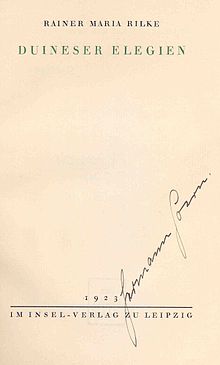 Title page of the first edition | |
| Author | Rainer Maria Rilke |
|---|---|
| Original title | Duineser Elegien |
| Language | German |
| Genre | Elegy |
| Published | 1923 Insel-Verlag |
Original text | Duineser Elegien at German Wikisource |
The Duino Elegies (German: Duineser Elegien) are a collection of ten elegies written by the Bohemian-Austrian poet Rainer Maria Rilke. He was then "widely recognized as one of the most lyrically intense German-language poets",[1] and began the elegies in 1912 while a guest of Princess Marie von Thurn und Taxis at Duino Castle on the Adriatic Sea. The poems were dedicated to the Princess upon their publication in 1923. During this ten-year period, the elegies languished incomplete for long stretches of time as Rilke had frequent bouts with severe depression—some of which were related to the events of World War I and being conscripted into military service. Aside from brief periods of writing in 1913 and 1915, he did not return to the work until a few years after the war ended. With a sudden, renewed burst of frantic writing which he described as a "boundless storm, a hurricane of the spirit"[2]—he completed the collection in February 1922 while staying at Château de Muzot in Veyras, Switzerland. After their publication in 1923, the Duino Elegies were soon recognized as his most important work.
The Duino Elegies are intensely religious, mystical poems that employ the symbolism of angels and salvation, but in a manner atypical of Christian interpretations. Rilke begins the first elegy in an invocation of philosophical despair, asking: "Who, if I cried out, would hear me among the angelic orders?" (Wer, wenn ich schriee, hörte mich denn aus der Engel Ordnungen?)[3] and later declares that "each single angel is terrifying" (Jeder Engel ist schrecklich).[4] While labelling of these poems as "elegies" would typically imply melancholy and lamentation, many passages are marked by their positive energy. Together, the Duino Elegies are described as a metamorphosis of Rilke's "ontological torment" and an "impassioned monologue about coming to terms with human existence", discussing themes of "the limitations and insufficiency of the human condition and fractured human consciousness ... man's loneliness, the perfection of the angels, life and death, love and lovers, and the task of the poet".[5]
Rilke's poetry, and the Duino Elegies in particular, influenced many of the poets and writers of the twentieth century. In popular culture, his work is frequently quoted on the subject of love or of angels and referenced in television programs, motion pictures, music and other artistic works, in New Age philosophy and theology, and in self-help books.
- ^ Poetry Foundation 2022.
- ^ Rilke 1948, p. 291: Letter to Lou Andreas-Salomé, 11 February 1922
- ^ Rilke 1923, "First Elegy", line 1.
- ^ Rilke 1923, "First Elegy", line 6.
- ^ Dash 2011, p. 356.